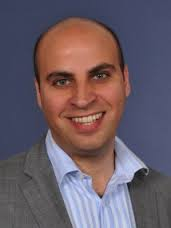Go to
September 30, 2013
Next Generation Neural Interfaces: Towards 1,000-Channel BMIs with on-chip Spike Sorting
Monday, 30 September 2013 at 16h00 in room INF 328
Timothy Constandinou, Imperial College, London, UK
Abstract: The understanding of the human brain is undoubtedly one of the key remaining mysteries of the 21st century. To this end, the relentless progress in CMOS technology is starting to make real impact in neuroscience. New tools have been developed for observing brain activity and soon it will be the case that Brain Machine Interfaces (BMIs) will record thousands of neurons. In fact, it has recently been predicted that the number of simultaneously recorded neurons will double every 7.4 years, dubbed the Moore's law of neural recording. However, with this increase in channels also comes increased hardware demands and thus simply sending raw data as we do today is no longer possible. By reviewing the progress achieved to date within the neural engineering and BioCAS communities, the key technological bottlenecks can be identified. In an effort to then balance resource (power, area and communication bandwidth) while maintaining data quality, real-time and on-node spike sorting has been proposed to achieve efficient channel utilization. The talk will focus on progress made to date within our Next Generation Neural Interfaces project towards such implantable, high channel count interfaces with on-node spike sorting.
 About the Speaker: Timothy G. Constandinou received the B.Eng. degree in electrical and electronic engineering and the Ph.D. degree from Imperial College of Science, Technology and Medicine, London, UK, in 2001 and 2005, respectively. He was a Research Officer in Bionics with the Institute of Biomedical Engineering, Imperial College of Science, Technology and Medicine, until joining academic faculty in 2010. Currently, he is a Lecturer with the Department of Electrical and Electronic Engineering, Imperial College of Science, Technology and Medicine, and the Deputy Director with the Centre for Bio-Inspired Technology, Imperial College of Science, Technology and Medicine. His research utilises integrated circuit and microsystem technologies to develop ultra low power implantable devices, brain-machine interfaces, and medical devices in general. His main focus is to develop microelectronics that interface with neural pathways for restoring lost function in sensory, cognitive and motor impaired individuals. Dr. Constandinou is a Senior Member of the IEEE, a Fellow of the IET, a Chartered Engineer and member of the IoP and SPIE. He serves on the BioCAS and Sensory Systems Technical Committees of the IEEE CAS Society, was Technical Program Co-Chair of the 2010 and 2011 IEEE BioCAS Conferences, Technical Program Track Co-Chair (Bioengineering) of the 2012 IEEE ICECS Conference, Technical Program Track Chair (ASICs) of the 2012 BSN Conference, and also serves on the IET Prizes and Awards committee.
About the Speaker: Timothy G. Constandinou received the B.Eng. degree in electrical and electronic engineering and the Ph.D. degree from Imperial College of Science, Technology and Medicine, London, UK, in 2001 and 2005, respectively. He was a Research Officer in Bionics with the Institute of Biomedical Engineering, Imperial College of Science, Technology and Medicine, until joining academic faculty in 2010. Currently, he is a Lecturer with the Department of Electrical and Electronic Engineering, Imperial College of Science, Technology and Medicine, and the Deputy Director with the Centre for Bio-Inspired Technology, Imperial College of Science, Technology and Medicine. His research utilises integrated circuit and microsystem technologies to develop ultra low power implantable devices, brain-machine interfaces, and medical devices in general. His main focus is to develop microelectronics that interface with neural pathways for restoring lost function in sensory, cognitive and motor impaired individuals. Dr. Constandinou is a Senior Member of the IEEE, a Fellow of the IET, a Chartered Engineer and member of the IoP and SPIE. He serves on the BioCAS and Sensory Systems Technical Committees of the IEEE CAS Society, was Technical Program Co-Chair of the 2010 and 2011 IEEE BioCAS Conferences, Technical Program Track Co-Chair (Bioengineering) of the 2012 IEEE ICECS Conference, Technical Program Track Chair (ASICs) of the 2012 BSN Conference, and also serves on the IET Prizes and Awards committee.
Secondary navigation
- January 29, 2018
- August 30, 2017
- Past seminars
- 2016 - 2017 Seminars
- 2015 - 2016 Seminars
- 2014 - 2015 Seminars
- 2013 - 2014 Seminars
- 2012 - 2013 Seminars
- 2011 - 2012 Seminars
- 2010 - 2011 Seminars
- 2009 - 2010 Seminars
- 2008 - 2009 Seminars
- 2007 - 2008 Seminars
- 2006 - 2007 Seminars
- August 31, 2007
- June 29, 2007
- June 20, 2007
- June 5, 2007
- May 30, 2007
- May 16, 2007
- May 15, 2007
- April 24, 2007
- March 27, 2007
- March 14, 2007
- February 9, 2007
- February 8, 2007
- January 12, 2007
- December 5, 2006
- November 14, 2006
- October 31, 2006
- October 27, 2006
- October 26, 2006
- October 20, 2006
- September 20, 2006
- September 20, 2006
- September 20, 2006
- September 19, 2006
- 2005 - 2006 Seminars
- August 23, 2006
- August 22, 2006
- June 26, 2006
- June 20, 2006
- June 16, 2006
- June 7, 2006
- June 6, 2006
- May 30, 2006
- May 17, 2006
- May 10, 2006
- April 27, 2006
- April 12, 2006
- March 31, 2006
- March 29, 2006
- March 22, 2006
- March 15, 2006
- February 27, 2006
- February 8, 2006
- January 25, 2006
- January 19, 2006
- January 18, 2006
- January 17, 2006
- January 11, 2006
- November 30, 2005
- November 23, 2005
- November 2, 2005
- October 26, 2005
- October 25, 2005
- October 5, 2005
- September 28, 2005
- 2005 Seminars

